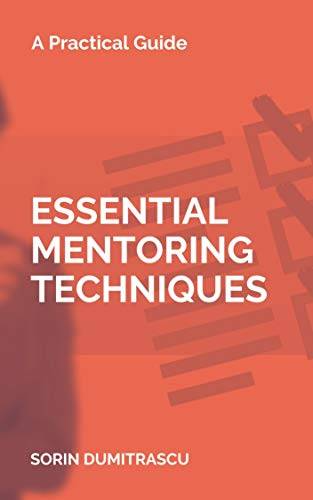

Essential Mentoring Techniques: A Practical Guide
by Sorin Dumitrascu
We live in an age of rapid change and technological achievement. But as in ages past, the most valuable asset to any organization is still the accumulated knowledge and experience of the people who work there. So how can an organization ensure that this legacy is retained and passed on to new generations of employees? One answer is mentoring.
The word mentor comes from a character in ancient Greek mythology. In Homer's epic work The Odyssey, Mentor was a trusted advisor to Odysseus and caretaker to Odysseus's son. Athena, the goddess of wisdom, took the form of Mentor to teach and guide the boy.
In the modern business world, the objective of mentors is the same – to teach, guide, and share wisdom. When business mentoring is implemented appropriately, it can improve employees' business knowledge, foster relationships within the organization, and enhance job satisfaction and retention.
This course covers the key concepts involved in workplace mentoring. You'll discover the purpose and mutual benefits of mentoring. You'll learn about the differences between coaching and mentoring relationships. You'll find out about mentoring programs and mentoring models. You'll also learn about the characteristics that help make mentoring programs successful and about the different aspects of formal and informal mentoring.
Mentoring is an effective way to improve performance in your organization. It enables you to link experienced individuals with less experienced colleagues. Mentors can share their knowledge and expertise with their mentees, and develop long-term working relationships with them.
In order to ensure the success of your mentoring program, you must prepare and plan for it carefully. Effective mentoring is more likely to occur when you implement it in a structured manner. Set out expectations and a time line for your program. The program should also include the necessary resources and guidance to allow your mentees to acquire skills successfully. And it must foster a mutually beneficial mentoring relationship for participants.
You can take a number of steps to ensure that your mentoring program will be successful. For example, you need to ensure your mentoring goals are aligned with the personal goals of the participants. You should carefully select and match participants for the program. And incorporate personal development programs into the mentoring process.
This course covers the steps needed to initiate a mentoring program in your organization. It begins by detailing the elements of a successful mentoring program. It then explains how you can plan the mentoring program. And it concludes by explaining how to establish the mentoring process, including the creation of personal development plans.
The word mentor comes from a character in ancient Greek mythology. In Homer's epic work The Odyssey, Mentor was a trusted advisor to Odysseus and caretaker to Odysseus's son. Athena, the goddess of wisdom, took the form of Mentor to teach and guide the boy.
In the modern business world, the objective of mentors is the same – to teach, guide, and share wisdom. When business mentoring is implemented appropriately, it can improve employees' business knowledge, foster relationships within the organization, and enhance job satisfaction and retention.
This course covers the key concepts involved in workplace mentoring. You'll discover the purpose and mutual benefits of mentoring. You'll learn about the differences between coaching and mentoring relationships. You'll find out about mentoring programs and mentoring models. You'll also learn about the characteristics that help make mentoring programs successful and about the different aspects of formal and informal mentoring.
Mentoring is an effective way to improve performance in your organization. It enables you to link experienced individuals with less experienced colleagues. Mentors can share their knowledge and expertise with their mentees, and develop long-term working relationships with them.
In order to ensure the success of your mentoring program, you must prepare and plan for it carefully. Effective mentoring is more likely to occur when you implement it in a structured manner. Set out expectations and a time line for your program. The program should also include the necessary resources and guidance to allow your mentees to acquire skills successfully. And it must foster a mutually beneficial mentoring relationship for participants.
You can take a number of steps to ensure that your mentoring program will be successful. For example, you need to ensure your mentoring goals are aligned with the personal goals of the participants. You should carefully select and match participants for the program. And incorporate personal development programs into the mentoring process.
This course covers the steps needed to initiate a mentoring program in your organization. It begins by detailing the elements of a successful mentoring program. It then explains how you can plan the mentoring program. And it concludes by explaining how to establish the mentoring process, including the creation of personal development plans.

